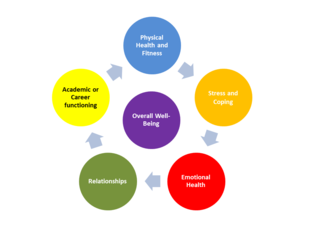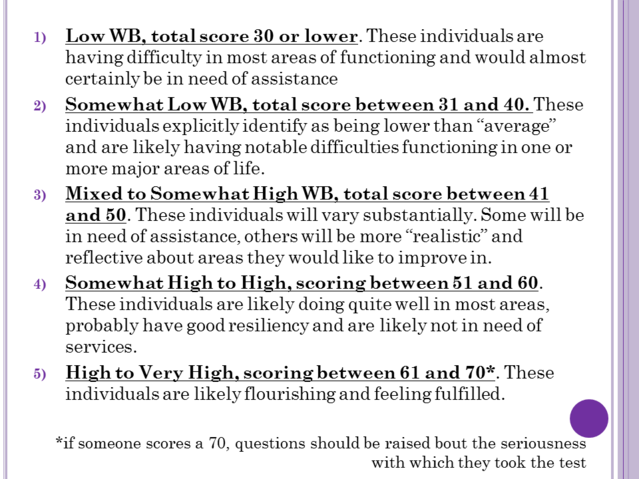Health
A Quick Self-Assessment of Well-Being
A self-assessment of psychological health and well-being.
Posted December 18, 2015
In a related blog on college student mental health, I make the point that we need awareness about our well-being. Here I offer a quick screen for folks interested in their mental health. Note that this measure was designed for college students, but can be taken by folks not in college. To do so, alter item 7 when you read it to refer to your career functioning, rather than academic functioning.

An Assessment of Well-Being for College Students
Below are a series of ten statements that describe an attribute associated with your life and functioning and then describe the low and high ends of that attribute. Please read each item carefully, and then rate it on the appropriate number on the scale ranging from one to seven indicating where you fall on that attribute. Respond to the item based on how you have generally felt during the past month. There are no right or wrong answers, so just answer as honestly as you can.
1. Please rate your overall satisfaction with your life. An individual with high life satisfaction feels pleased with most major domains, is at peace with the past, and generally feels fulfilled and content. In contrast, someone with low life satisfaction often wishes things were different, experiences problems in several major areas, and often feels dissatisfied, alienated, or unfulfilled.

2. Please rate your sense of mastery over the environment, which is the degree to which you feel competent to meet the demands of your situation. Individuals high in environmental mastery feel they have the resources and capacities to cope, adjust and adapt to problems, and are not overwhelmed by stress. Those with a low level of environmental mastery may feel powerless to change aspects of their environment with which they are unsatisfied, feel they lack the resources to cope, and are frequently stressed or overwhelmed.

3. Please rate your degree of emotional health. Someone who is functioning well in this domain is able to experience the full range of emotions, is comfortable with their feelings, and generally feels more positive as opposed to negative emotions (i.e., more joy and excitement relative to frustration and anxiety). In contrast, someone who is having trouble in this domain has difficulty in effectively connecting with their emotions, often feels overwhelmed or afraid of their emotions, and tends to feel more negative than positive emotions.

4. Please rate the overall quality of your relationship with others. An individual with positive relationships feels connected, respected, and well-loved. They can share aspects of themselves, experience intimacy, and usually feel secure in their relations. In contrast, individuals with poor relationships often feel unappreciated, disrespected, unloved, disconnected, hostile, rejected, or misunderstood. They tend to feel insecure and sometimes alone or distant from others.

5. Please rate your sense of autonomy. Individuals with high levels of autonomy are independent, self-reliant, can think for themselves, do not have a strong need to conform, and don’t worry too much about what others think about them. In contrast, individuals low in autonomy feel dependent on others, are constantly worried about the opinions of others, are always looking to others for guidance, and feel strong pressures to conform to others’ desires.

6. Please rate your levels of self-acceptance, which refers to the degree positive attitudes you have about yourself, your past behaviors and the choices that you have made. Someone with high self-acceptance is pleased with who they are and accepting of multiple aspects of themselves, both good and bad. In contrast, individuals with low self-acceptance are often self-critical, confused about their identity, and wish they were different in many respects.

7. Please rate your levels of satisfaction with your academic functioning (change to occupational functioning if you are not in school). This refers to how happy you are with your academic performance, what you are learning and your sense that it is preparing you for a fulfilling career. Individuals highly satisfied with their academic functioning are pleased with the grades they get, enjoy the material they are learning and are hopeful about how this is preparing them for future careers they will find fulfilling. In contrast, those dissatisfied with their academic functioning are struggling to get the grades they desire, are frustrated with either what they are learning or their ability to learn the material and are confused, disappointed or anxious about their future career opportunities.

8. Please rate your levels of satisfaction with your health and fitness. This refers to how happy you are with your bodily health and fitness levels. An individual high in health and fitness does not have chronic health problems, is physically fit, and feels comfortable with their bodies and physical functioning. In contrast, a person who is low in health and fitness experiences chronic health problems, does not have healthy eating, sleeping or exercise patterns, or feels deeply dissatisfied with their bodies or physical functioning.

9. Please rate the level of your sense of purpose in life. Individual with a high sense of purpose sees their life has having meaning, they work to make a positive difference in the world, and often feel connected to ideas or social movements larger than themselves. Such individuals have a sense that they know what their life is about. Individuals low in this quality often question if there is a larger purpose, do not feel their life makes sense, and attribute no higher meaning or value to life other than the fulfillment of a series of tasks.

10. Please rate your level of personal growth. Individuals with high levels of personal growth see themselves as changing in a positive direction, moving toward their potential, becoming more mature, increasing their self-knowledge, and learning new skills. Individuals low in personal growth feel no sense of change or development, often feel bored and uninterested in life, and lack a sense of improvement over time.

To score this measure, simply add up the total, which should range between 7 to 70. In terms of interpreting what this scale means, table below offers a basic grouping. If you score a 50 or below, then some attention to your psychological health and well-being is likely warranted. Below a 40 is definitely suggestive of notable problems in living. In addition, any specific domain in which you scored 4 or below might warrant some reflection.





